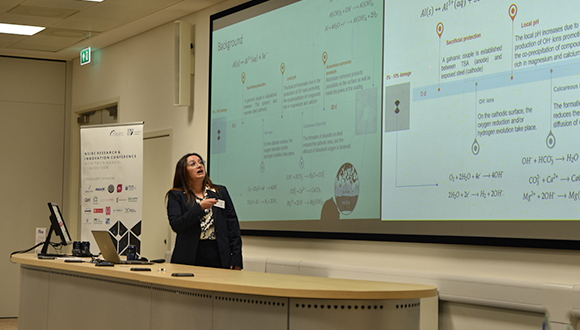Mon, 07 August, 2023
New Study Combines Electrochemical Monitoring with In-Situ Imaging of Thermal Spray Aluminium Coating to Enhance Understanding of Corrosion Resistance in Marine Environments
Cambridge, UK - A recent study by NSIRC PhD Student Adriana Castro-Vargas has shed new light on the behaviour of Thermal Spray Aluminium (TSA) coating in synthetic seawater. TSA coatings are commonly used to protect steel structures in marine environments, but their complex nature - due to their porosity, anodic trend and roughness - has made them difficult to study and interpret, particularly in terms of electrochemical data on corrosion rates.
In-situ imaging and electrochemical monitoring of damaged thermal spray aluminium coating in synthetic seawater
Adriana's study, which has been published in the International Journal Electrochimica Acta, involved a systematic approach combining electrochemical monitoring with in-situ imaging to gain insight into the protection mechanism provided by TSA in the presence of defects. This allowed the team to inspect surface activity and related phenomena in parallel with the evolution of the potential, providing a more complete understanding of the behaviour of TSA coatings.
The study found that TSA coatings with exposed steel reached corrosion potential stabilisation faster than those without defects. When defects are machined before immersion, iron dissolution occurs within the first few hours of exposure until the air-formed oxide layer deteriorates, activating the aluminium surface and achieving the recommended protection potential for steel. Larger defect sizes increase the time it takes for TSA to provide cathodic protection once the sample is in contact with synthetic seawater. However, if the defect is created after exposure, aluminium corrosion products and/or calcareous deposits clog the pores, reducing self-corrosion of aluminium and providing immediate protection to exposed steel.
 PhD Student Adriana Castro-Vargas presenting at the NSIRC Research & Innovation Conference in June 2023. Photo: TWI Ltd / NSIRC
PhD Student Adriana Castro-Vargas presenting at the NSIRC Research & Innovation Conference in June 2023. Photo: TWI Ltd / NSIRC
Adriana thanked the Lloyd's Register Foundation, a global charity that helps to protect life and property by supporting engineering-related education, for their sponsorship and support. She also acknowledged her supervisor and co-author, Dr Shiladitya Paul from TWI, the University of Leicester and Materials Innovation Centre, as well as NSIRC, for making the research possible.
To access the full paper, visit Science Direct. For more information about Adriana's research and the other PhD Students at NSIRC, head to the Our Research page.
Contact:
- Name: Adriana Castro-Vargas
- Email: enquiries@nsirc.co.uk
- Phone: +44 (0) 1223 899 000